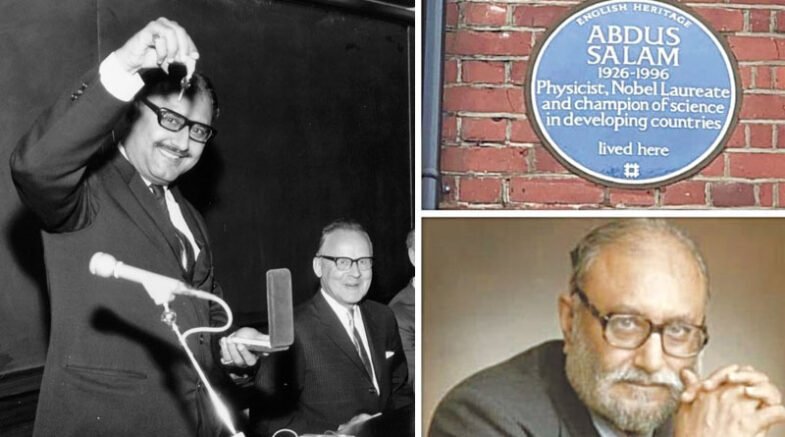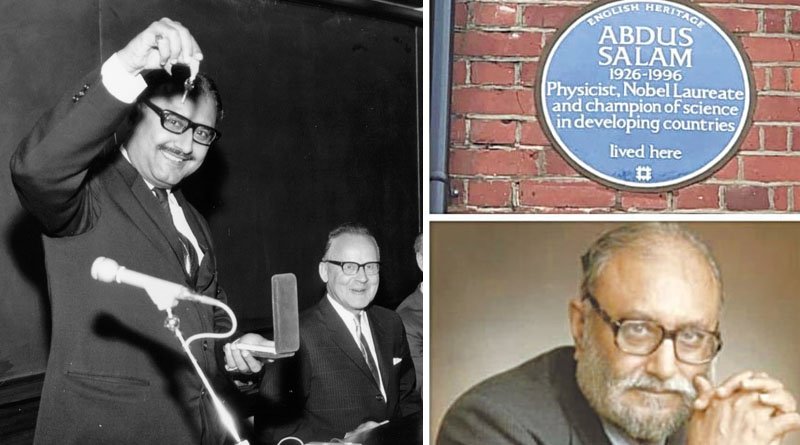Dr. Salam suggested that one billion dollars should be spent initially on the formation of this foundation, which will help Muslim students obtain such scientific education. This foundation should be run by eminent and well-known scientists from the Islamic world.

Dr. Abdul Salam believed in scientific research and supported the scientific movement. After getting the Nobel Prize in 1979, he worked hard to set up the Islamic Science Foundation to promote science in Islamic countries. Dr. Abdul Salam has the honor of being the first Muslim Nobel laureate.
King Hassan of Morocco issued a long royal decree to Dr. Abdus Salam in which he paid tribute to him, writing: “With your success, Islamic civilization and thought have been enlightened.”
According to the June 29, 1980, issue of the daily Al-Fazl; after receiving the Nobel Prize, Dr. Abdul Salam has visited Islamic countries and raised the slogan of establishing “Islamic Science Foundation” in many places, which is a clear proof that he was the greatest Muslim scientist in this era. Abdus Salam was willing and sympathetic, so the Islamic countries agreed to the slogan of the “Islamic Science Foundation” and approved it.
A renowned Pakistani daily, Nawai Waqt, writes:
“Pakistani scientist Dr. Abdus Salam, who won the Nobel Prize, made a proposal in 1973 that Muslim countries should establish an Islamic Science Foundation.” Last week, a conference was held in Jeddah in which the final decision was taken to establish this institution. In this way, the Islamic Summit Conference approved the proposal of Dr. Abdus Salam in February 1974. But the decision to implement it has now been made. The Jeddah conference decided to implement the establishment of the foundation.
In addition to the scientists of Islamic countries, the King of Saudi Arabia congratulated Dr. Abdus Salam on receiving the Nobel Prize and called it a proud achievement for the Islamic world.
Daily Nawai Waqt editorial dated 18/ November 1979 writes, “Understanding the importance of Islamic Science Foundation in Saudi Arabia, Dr. Abdus Salam is welcomed in Jeddah. And it is called “the pride of the Islamic world”.
An interview of Dr. Abdus Salam was published in a local newspaper, “Al-Fazl Rabwah,” in which Dr. Abdul Salam, regarding the establishment of the Islamic Science Foundation, said:
“It’s a move in a good direction, and I’m very happy with it.” In fact, the initial proposal was much higher than the current one. “I persuaded Mr. Bhutto in 1974 to set up a foundation with a capital of one billion dollars, and the Islamic Summit recognized it.” But nothing was done about it after that. Then, in 1981, General Zia-ul-Haq agreed to take up the matter at the Taif Summit. The foundation was established. Now I know. “Given that the amount actually received by the foundation so far is only six million dollars, you will agree with me that Muslim governments can give more than that.” Daily “Al-Fazl Rabwah,” October 8, 1984.
After receiving only a few million dollars instead of the billion promised, Dr. Abdul Salam complained about the attitude of the Muslim countries and expressed his disappointment with them. Therefore, daily Jang London writes: “Nobel Prize-winning Pakistani scientist Dr. Abdus Salam will establish the Science Foundation.” “The Islamic Conference has approved 50 million dollars instead of 1 billion dollars.”
Talking about the characteristics of the proposed science foundation, Nobel Prize-winning Pakistani scientist Dr. Abdus Salam said that a foundation will be established for the promotion of science in Islamic countries so that the talented scientists of those countries can increase their knowledge. While giving an interview, Dr. Salam said that concrete measures have not been taken for the promotion of scientific studies in Islamic countries.
Dr. Salam founded the International Center for Theoretical Physics (ICTP) in Trieste, Italy. He is also the Director of this center. A thousand scientists receive training in physics from this center. Dr. Salam’s center is also supported by the International Atomic Energy Agency and UNESCO.
Dr. Salam said that the foundation will be a non-political organization, and it will be run by scientists from Muslim countries. Apart from this, it will be linked to the organization of the Islamic Conference, however, Dr. Salam has expressed his regret that he had proposed one billion dollars for the proposed foundation, but the Islamic Conference approved 5 million dollars for it.
In the same context, the newspaper Nawai Waqt Karachi, regarding the financial difficulties Dr. Salam faced in establishing the Islamic Science Foundation, writes: “Dr. Abdus Salam has said that Islamic countries are completely isolated in international science, and they are not allowed to do science.” The method of development is not known. He said that he wants to establish a separate foundation for the promotion and development of science.
The Islamic Conference has approved the plan; instead of the one billion dollars proposed by Dr. Salam, the Muslim Conference has approved 50 million dollars, and only 6 million dollars have been released in a year, which made Dr. Salam look disappointed.
A report in the weekly “Lahore” states that: “Dr. Abdus Salam has urged the oil-producing countries of the Middle East to establish a science foundation for the promotion of scientific studies in the region.” He suggested that one billion dollars should be spent initially on the formation of this foundation, which will help Muslim students obtain such scientific education. This foundation should be run by eminent and well-known scientists from the Islamic world.
Dr. Salam liked how Kuwait helped spread scientific knowledge in the Islamic world. He said that the Science Foundation of Kuwait and the University of Kuwait gave him a lot of money to start this organization.
It is important to note that Dr. Abdus Salam was the one who got the ICTP started in 1964. Dr. Salam started working on this center in Pakistan, but the government of Pakistan wasn’t interested at the time. So, he talked to other Third World governments, and Italy promised him resources in Trieste. And ICTP came into being, which later became known as the Dr. Abdus Salam International Center for Theoretical Physics and is still engaged in improving scientific awareness among scientists in developing countries, especially Pakistanis.
